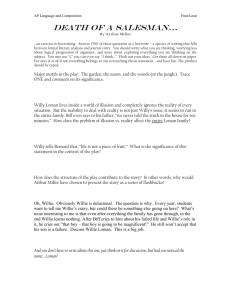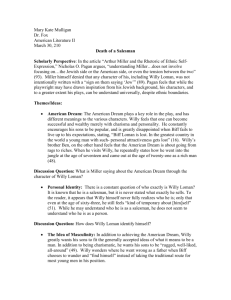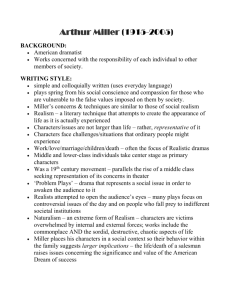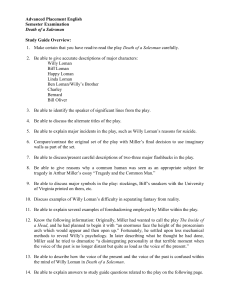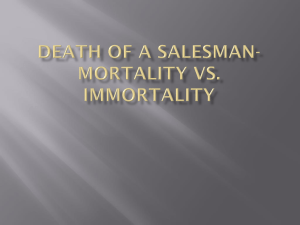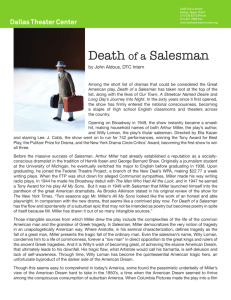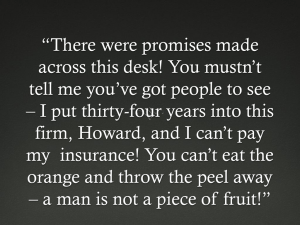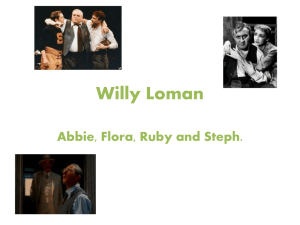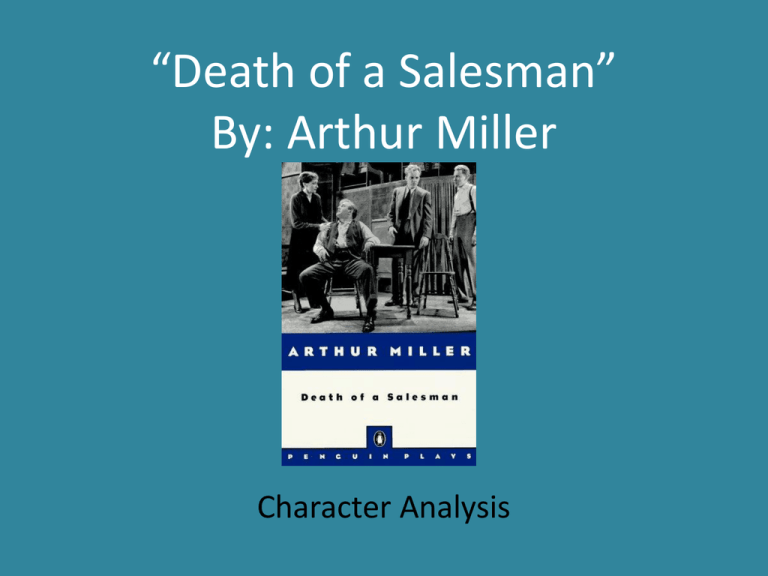
“Death of a Salesman”
By: Arthur Miller
Character Analysis
Willy Loman
• The common man
• Symbolizes the cruel paradox of human existence.
• Seen as ritual head of the family.
• Seeks to discover a design in the paradoxical movement of life; to
impose upon it a sense of meaning greater that that conferred upon it
by reality.
• His life experiences seem to intermingle and disturb the logical flow of
reality.
• He views his life as a totality. Conventions of time and place are not
relevant for him.
• Has high ideals; possibly unattainable ones
• Wants to be loved by all; Wants to succeed by terms that do not suit
his nature; wants to leave his mark upon the world.
• Feels he has to succeed and the only way to show his success is to
acquire money and material goods. He does not want to face the fact
that he is not earning enough.
• When he finally evaluates his performance he realizes that he has
fallen far short of his goals at that point. Suicide becomes an act of
valor for him.
Linda Loman
• Tries to share in Willy’s ideals and suffers great torment as she observes
Willy’s decline knowing that she is unable to help Willy or her family.
• Fails to understand what happens to Willy and fails to believe what has
occurred between him and Biff, but still manages to retain a belief in the
need to treat human beings properly.
• Loyal and supportive wife and mother.
• Her anger stems from her beliefs in the Loman family and memories of her
happy time in the past.
• She is a woman struggling to come to terms with her city, her husband,
and he sons.
• Linda, as the eternal wife and mother, the fixed point of affection both
given and received, the woman who suffers and endures, is in many ways,
the earth mother who embodies the play’s ultimate moral value, love.
• In the beautiful, ironic complexity of her creation, she is also Willy’s and
their sons’ destroyer. In her love Linda has accepted Willy’s greatness and
his dream, but while in her admiration for his dreams, it is lethal. She
encourages Willy’s dream yet she will not let him leave her for the New
Continent, the only realm where the dream can be fulfilled.
Biff Loman
• Lacks self- assurance because of the uncertainty about
his father’s attitude towards him and his doubts about his
own life and future.
• Has not found his place in society, but also realizes that
he does not fit into any of the openings that society has
made.
• As a result of Willy’s lies he is undisciplined and
disillusioned.
• Sees the city as a concrete jungle, but refuses to
conform to the city’s demands.
Happy Loman
• Similar to Willy because he is lost due to the fact that he
has never allowed himself to turn his face towards
defeat.
• Regular guy, has a job, hopes for promotion, committed
to conform
• Needs to pretend to be more than he really is (Like father
like son)
• Likes women but treats them disrespectfully.
• Never acquires Biff’s ultimate self-knowledge and
realization of the truth.
• Remains the Loman that he always was, incapable of
interpreting the message of Willy’s failure.
Who is the protagonist of this play?
Willy Loman
Biff Loman
Who contributes to the destruction
of more than one of the main
characters?
Happy Loman
Linda Loman
Which son shares the most
characteristics with Willy?
Biff Loman
Happy Loman
Listen to the following monologue.
Who is speaking?
Willy Loman
Linda Loman
For more information about “Death of
a Salesman” and Arthur Miller:
• Please visit: Here
Bilbliography
Miller, Arthur. Death of a Salesman. New York: Penguin Group, 1976. Print.
Picture:
"Death of a Salesman by Arthur Miller « Blue Blazes Book Blog." Blue Blazes Book Blog.
19 Jan. 2010. Web. 02 Nov. 2010.
<http://blueblazeslib.wordpress.com/2010/01/19/death-of-a-salesman-by-arthurmiller/>.
"Arthur Miller's Greatest Work Was Never Performed." The Book Den. 2005. Web. 03
Nov. 2010. <http://thebookden.blogspot.com/2008/09/arthur-millers-greatestwork-was-never.html>.


